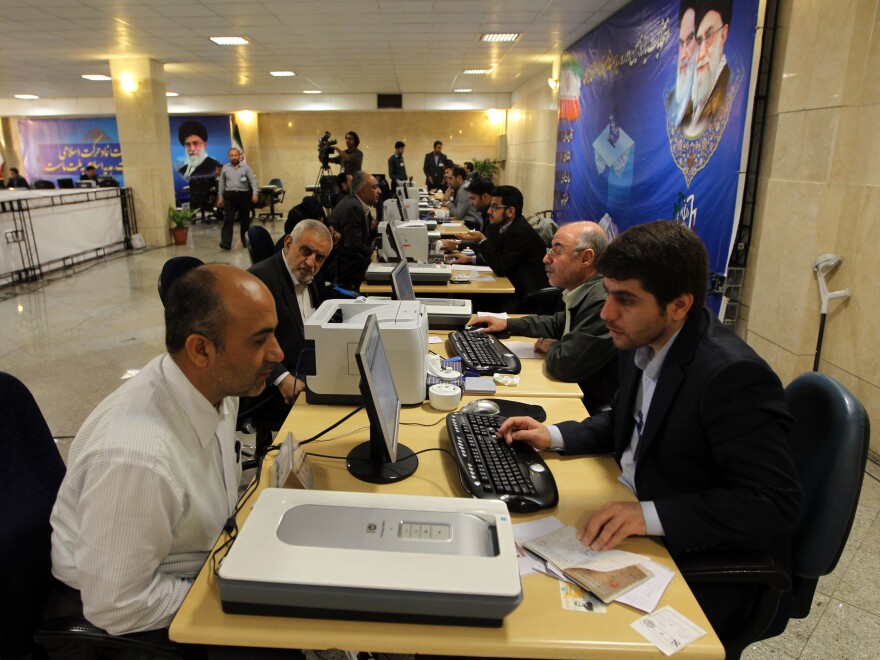Iranians choose a new president next month, and one thing Iran's leaders are intent on avoiding is a repeat of the massive street protests that followed Mahmoud Ahmadinejad's controversial re-election in 2009.
The sponsors of those protests, known as the Green Movement, have been effectively silenced inside Iran, but not online. The heroine of a graphic novel about the violent suppression of dissent in 2009 is now launching a virtual campaign of her own.
Her name is Zahra, a wife and mother in Tehran who starred in the 2010 online graphic novel Zahra's Paradise. Zahra's Paradise happens to be the name of a vast cemetery in the Iranian capital, Tehran, where Iranians from ayatollahs to war veterans to student dissidents are buried.
Readers were riveted by Zahra's struggle to find her son Mehdi, who had disappeared during a street protest. As with many real-life Tehran mothers, Zahra's search ended at a graveside in Zahra's Paradise.
The Web comic became a global phenomenon and was translated into 15 languages. Now, Zahra's creators and the human rights group United for Iran have launched a new storyline in which she runs for president.
In the panel below, Zahra's best friend, Miriam, a caustic critic of the government who calls Iran's clerical leaders "clowns" presiding over a circus, urges Zahra to enter the campaign, despite Zahra's sighs that it won't bring her dead son back:
The Evin being referred to is Evin prison, allegedly the scene of the torture, rape and murder of political prisoners. Freeing political prisoners and ending the death penalty feature prominently in Zahra's campaign, along with demands for a transparent and fair voting process. United for Iran's executive director, Firuzeh Mahmoudi, says these are not things any real-life candidate would dare say in Iran these days.
"What our aim is for the next month is to use Zahra as a tool to talk about these issues," Mahmoudi says, "and directly calling on the leading candidates on their track record and the violations they have had in the past while they were in power, and asking them how would they run the country if they are elected."
The author of Zahra's Paradise is Amir Soltani, an Iranian-American. He says one key to its resonance with Iranians is that Zahra isn't a hard-line political dissident — she's just another ordinary Iranian caught up in the tragic aftermath of the 2009 election.
Soltani says Zahra's persistence and bravery can be found among Iranian women, like the mother of blogger Sattar Beheshti, who died in custody last year.
"This single woman, with nothing but her pride and her courage and her convictions, is taking on the Islamic Republic," Soltani says. "She doesn't even have much of an education. So the notion that protest is somehow the domain of leaders, or that protest somehow belongs to the educated is simply not true. At every level of Iranian society we're seeing protests."
But these behind-closed-door protests have nothing like the impact of the 2009 public demonstrations, and activists in exile say the government and security forces are determined to prevent something similar from happening this year.
What our aim is for the next month is to use Zahra as a tool to talk about these issues.
Dozens of journalists, bloggers and students have been arrested in recent months, according to the United Nations, and leading opposition figures Mir-Hossein Mousavi and Mehdi Karroubi remain under house arrest.
The Green Movement has been forced underground, and activists say the candidate attracting some attention from reformers, former President Akbar Hashemi Rafsanjani, is a founder of the Islamic Republic who seeks only marginal reforms.
Soltani, who left Iran when he was 12 years old, takes the long view and argues that young Iranians will eventually throw off the clerical regime. In the meantime, he hopes that Zahra's virtual campaign for president will give voice to their aspirations.
"I think there's another Iran. I think there is an Iran that has incredible potential," he says. "And that Iran does not have a reflection in the current elections. That's the Iran Zahra represents. You know, in a way, demography is destiny. And a new Iran is beginning to emerge, and we want to honor that Iran.
But Soltani can't say when that "other Iran" will emerge, only that it's not likely to happen this election season.
Copyright 2021 NPR. To see more, visit https://www.npr.org.




